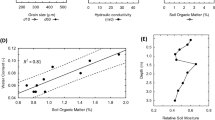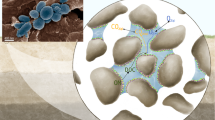Abstract
OXIDATION-REDUCTION or redox potential measurements have been widely used in the study of chemical and biological reactions in waterlogged soils. The oxidation-reduction potential is used to characterize aeration in waterlogged soils because the more commonly used measurements of oxygen concentration and oxygen diffusion rate are of little value. Dissolved oxygen is usually completely absent or present in very low concentration in a waterlogged soil.
This is a preview of subscription content, access via your institution
Access options
Subscribe to this journal
Receive 51 print issues and online access
$199.00 per year
only $3.90 per issue
Buy this article
- Purchase on Springer Link
- Instant access to full article PDF
Prices may be subject to local taxes which are calculated during checkout
Similar content being viewed by others
References
Knight, B. C. J. G., Biochem. J. (London), 24, 1075 (1930).
Hanke, M. E., and Katz, Y. J., Arch. Biochem., 2, 183 (1943).
Kefauver, M., and Allison, F. E., J. Bacteriol., 73, 8 (1957).
Author information
Authors and Affiliations
Rights and permissions
About this article
Cite this article
PATRICK, W. Apparatus for controlling the Oxidation-reduction Potential of Waterlogged Soils. Nature 212, 1278–1279 (1966). https://doi.org/10.1038/2121278a0
Published:
Issue Date:
DOI: https://doi.org/10.1038/2121278a0
This article is cited by
-
Trace Element Solubility in a Multimetal-Contaminated Soil as Affected by Redox Conditions
Water, Air, & Soil Pollution (2014)
-
The production of hydrogen sulphide in peats
Folia Microbiologica (1974)
-
Effect of Redox Potential on Manganese Transformation in Waterlogged Soil
Nature (1968)
Comments
By submitting a comment you agree to abide by our Terms and Community Guidelines. If you find something abusive or that does not comply with our terms or guidelines please flag it as inappropriate.



